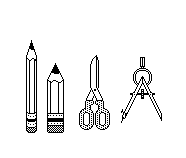
Seventh Grade Math Units of Study
Kelleen Farrell, Instructor
E-Mail: kfarrell@sonic.net
Website: kidzlearn.org
Phone: 209-257-5527 (w)
Unit 1: Consumer Math
Objectives:
Students will be able to:
- convert fractions to decimals and to percents and go in the reverse direction
- perform arithmetical calculations with fractions and decimals
- round off to the indicated place value
- develop a budget
- balance a checkbook
Lessons: This unit will focus on the arithmetic of daily life. Students will develop a budget, pay bills using checks, balance a checkbook, make deposits (yes, they will have a job and a paycheck and taxes!) They will also have a chance to play the stock market and develop a beginning understanding of economics.
Skill development: decimal place value, rounding off to the hundredths place, converting fractions to decimals using long division and calculators,converting decimals to fractions by recognizing the place value and reducing the resultant fraction, and converting decimals to percentages and vice versa by moving the decimal point in the appropriate direction.
Unit 2 : Probability
Objectives:
Students will be able to:
- calculate the probability of single and combined events in terms of fractions, percents, and decimals
- understand the fairness of a game using probability
- use probability to forecast events
Lessons: Development of conceptual understanding of probability through game investigations with spinners, coins and cubes beginning with single events and moving to multiple events. Students will use their arithmetic skills to perform calculations to find the probability of various events and tom compare theoretical probability with experimental probability to determine if a game is fair or unfair.We are using the principles of probability to reinforce arithmetic skills with fractions and decimals in order to use these to calculate probability of combined events.
Assessment: Daily worksheets that reinforce arithmetic skills. Weekly games with spinners, cubes and coins, and homework worksheets to reinforce classroom lessons. End-of-unit test.
Unit 3 : Algebra
Objectives:
students will be able to:
- evaluate expressions with variables by substituting values for the variables
- perform arithmetical calculations with integers (positive and negative whole numbers)
- perform arithmetical calculations with rationals (positive and negative fractions and decimals)
- solve one and two step equations
- combine like terms
- graph equations and models
- understand patterns through sequences
- model growth using algebraic equations
Lessons: We will develop a conceptual understanding of algebra by creating mathematical models of real-life events including modeling the stock market and population growth. We will also investigate sequences of numbers using a calculator and demonstrate graphing using a graphing calculator.We will learn what variables mean and how to use them in expressions and how to solve for them in equations. We will cover the Cartesian coordinate system and learn how to plot points and then how to plot points for equations to create the graph of an equation.
Skill development: performing arithmetic operations with positive and negative numbers, and plotting points and manipulating equations to solve for variables.
Assessment: Daily worksheets that reinforce arithmetic skills. Daily assignments on solving equations.Project on modeling growth. End-of-unit test.
Unit 4 : Geometry
Objectives:
students will be able to:
- understand the language of geometry and define commonly used terms
- use the definitions of regular polygons to find missing angles and sides
- compare similar polygons to find missing sides and angles using proportions
- compare congruent polygons to find missing angles and sides using proportions
Lessons: We will learn the language of geometry and use that language to compare shapes and angles. We will use these skills to build models of custom homes.
Skill development: arithmetic operations with proportions.
Assessment: Daily worksheets that reinforce arithmetic skills. Daily assignments on solving equations.Project on modeling growth. End-of-unit test.